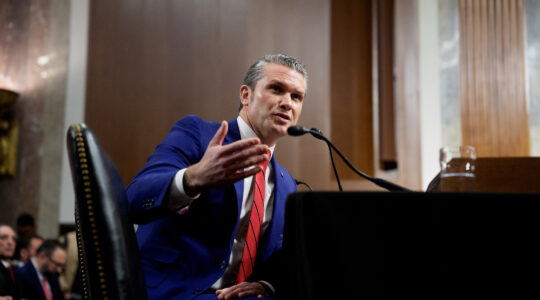According to a new study by RAVSAK: The Jewish Community Day School Network, enrollment at Jewish community day schools has held steady despite the recession.
RAVSAK, which counts as its members 111 pluralistic, non-denominational day schools, looked at the enrollment of its schools this year vs last year and found that it decreased less than one percent.
A year ago, as the recession took hold, the decline was 4.6 percent.
Enrollment at the schools for the current academic year in kindergartens through high school grades totals 26,896 students, a decrease of only 178 students from last year.
“We’ve stopped the bleeding,” said Dr. Marc Kramer, executive director of RAVSAK. “Schools have found effective ways to stabilize their numbers.
Here is more from RAVSAK. [[READMORE]]
ENROLLMENT NEARLY STEADY AT JEWISH COMMUNITY DAY SCHOOLS ACROSS NORTH AMERICA, ANNUAL SURVEY REVEALS
Negligible Decrease as Schools Weather Economic Downturn and Increase Awareness of Value of Jewish Education
New York – Oct. 18, 2010 – Despite a challenging economic climate, enrollment at Jewish community day schools in the U.S. and Canada holds nearly steady with last year’s levels, according to a just-released annual school survey.
Current school enrollment decreased less than one percent – 0.66 percent – from levels recorded during the 2009-10 academic year. The figure stands in sharp contrast to the 4.6 percent decline recorded a year ago.
The survey is conducted annually by RAVSAK: The Jewish Community Day School Network and is considered the most authoritative barometer of enrollment trends within the movement, covering 111 pluralistic, non-denominational day schools across the continent.
In real numbers, enrollment in the current academic year in kindergartens through high school grades totals 26,896 students, a decrease of only 178 students from 2009-10.
“We’ve stopped the bleeding,” said Dr. Marc Kramer, executive director of RAVSAK. “Schools have found effective ways to stabilize their numbers.
“In a very difficult environment, Jewish community day schools are taking action to maintain – and in some cases increase – their enrollments by rightsizing their institutions, seeking more philanthropic support, and successfully making the case that a Jewish education is invaluable and critical to the success of a child, his or her Jewish identity, and community.”
Among the areas of growth are the western region of the United States, where community day schools reported an enrollment increase of 1.37 percent, and Canada, where schools registered a 1.06 percent increase.
Larger schools with enrollments of between 300 and 600 students showed increases as well. Those with students numbering between 300 and 500 reported nearly a one-percent increase; those with study bodies totaling between 500 and 600 students showed an increase of about three quarters of a percent.
Still, there are pockets of continuing weakness. Community day schools in the mid-western region of the U.S. reported an overall 4.06 percent decrease in enrollment and those in the mid-Atlantic region saw enrollment drop by 2.54 percent.
Smaller schools continue to be harder hit, with those with student populations of less than 100 reporting an 8.16 percent drop from the last academic year.
The findings suggest that while the overall trend is in the right direction, schools – and especially smaller ones – must continue to find creative ways to highlight their value, officials noted.
“Last year was a blow to us due to the economy, but the new numbers belie the anecdotal evidence of decline,” said Arnee Winshall, RAVSAK president and founder of JCDS, Boston’s Community Day School. “The big takeaway is that we must focus on and broadcast the value of a community day school education.
“Our day schools provide a comprehensive, outstanding education in Jewish literacy and joy and Jewish life. But we really have to accentuate the value of making this choice. Our schools have to ensure it is known that Jewish education has a positive impact and our communities have to provide the resources to let them grow.”
Throughout the RAVSAK network of Jewish community day schools, officials are accommodating to the reality of the economy and making programming, financial and communications decisions to maintain or grow enrollments.
Although enrollment is slightly up at the Donna Klein Jewish Academy in Boca Raton, FL, this is due in part to an increase in tuition subsidies and historic devotion to the school within the community. Belt-tightening and pressure to find new revenue streams are constant challenges, officials said.
“We are hopeful that the economy is going to turn around,” said Karen Feller, head of school. “But until then, we are sticking with our students and their families, and they are sticking with us. They know our value. In the meantime, we all must remember this difficult period and plan well for the future.”
And at the Abraham Joshua Heschel Day School in Northridge, CA, officials have significantly increased financial aid packages, focused their public relations on the school’s successes, and improved programming. A new media and technology center, supported by a major gift to the school, is now open and framing education in a 21st century context.
“We made a conscious decision to do what we have to do to have a full school,” said Betty Winn, head of school, citing a slight increase in enrollment this year, to 378 students in grades pre-K to 8.
“Families must understand the value of the school. We don’t want them to choose between a day school and a summer camp to give their children a Jewish identity. It should and must be both."
National groups such as RAVSAK are establishing initiatives to properly equip member schools to survive difficulties and help ensure that overall enrollment numbers continue to trend upwards.
RAVSAK, for example, will soon announce new programs to strengthen the Jewish education component at schools, and funding to enhance professional leadership development at smaller schools, Kramer said.
“The overall results are heartening because they suggest that even as the economy has not rebounded strongly, enrollment declines have been reduced to a trickle in the RAVSAK sector,” noted Yossi Prager, North American executive director of the AVI CHAI Foundation, which supports community day school initiatives. “As the economy improves, day school enrollment should begin to grow again.
“But the challenge is not only economic. Especially among the schools that are really struggling, there is work to do on the community and individual school levels. What does this mean? We must focus on the viability, affordability and quality of our Jewish day schools.”
Kramer agreed: “While these new numbers are very validating, there are pieces of data that are clarion calls for change and new attention, and this is what the conversation will be about going forward.”
JTA has documented Jewish history in real-time for over a century. Keep our journalism strong by joining us in supporting independent, award-winning reporting.





